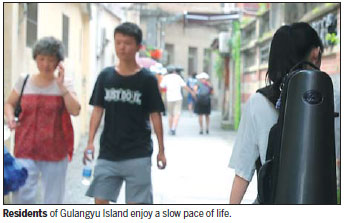A nighttime stroll through narrow streets, happy crowds
With the deep night sky above, surrounded by salty sea winds and crowds of lovers, I finally board the ship to Gulangyu Island after a day's work.
I cannot see a single car or bicycle, and no one seems in a rush to get anywhere.
Tourists stroll along the many narrow lanes, among the local small stores selling food, ornaments and postcards.
There are many fresh local foods that I can't name. Even if you knew, the name is a tricky for non-locals to pronounce anyway.
The "frozen bamboo shoots", for example, turn out to be some type of sea worm encased in frozen soy sauce. It tastes quite good before I know what it is. The "noodles with satay sauce" are cooked with lobsters, clams and tofu in peanut soup. Paying only about 10 yuan ($1.49) for a bowl of seafood is much cheaper than I expect, having traveled from Beijing. The glittering, high buildings of the Xiamen mainland are clearly seen across the sea. Ships sail between the two harbors with passengers longing for the peace and relaxation of this small island.
I check my mobile mapping application to find the way to reach the beach. However, it guides me to residential areas where old buildings stand in line according to the rise and fall of the landscape. I come across new paths hidden around every corner. At nearly nine at night, I am not surprised to find myself lost in the maze of alleys.
On a steep hill, there are no street lamps and I can barely see the passersby.
I knew the island was a famous scenic spot where tourists from around the world flew all year round. However the unexpected experience teaches me another side of Gulangyu: it is a silent village on an isolated island, which belongs not to any outsider, but to the locals.
When I finally spot the harbor, it suddenly rains heavily and I have to return home.
The rain delays the schedule and visitors crowd into the waiting room, not knowing when or even if the ship will continue sevice.
During my short stay on this island, I feel a mixture of modernity and tradition, a combination of quietness and vigor.
Although there have been many changes over the years, Gulangyu - known as Kulangsu in the local dialect - still retains its own identity.
chenmeiling@chinadaily.com.cn

(China Daily 07/28/2017 page18)












